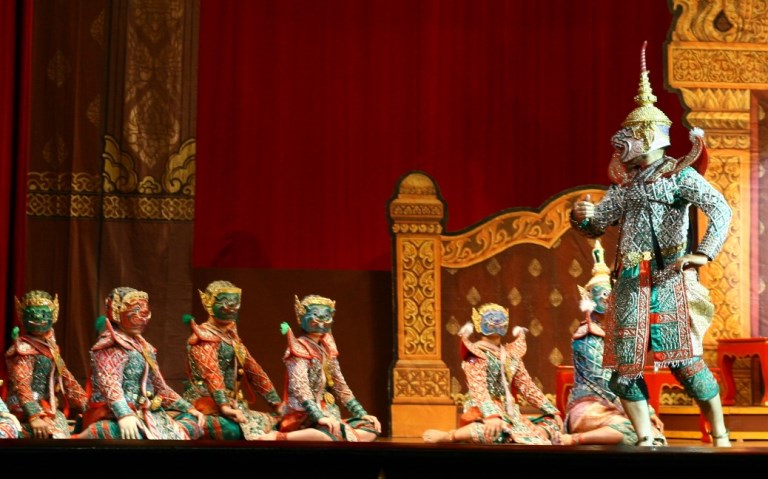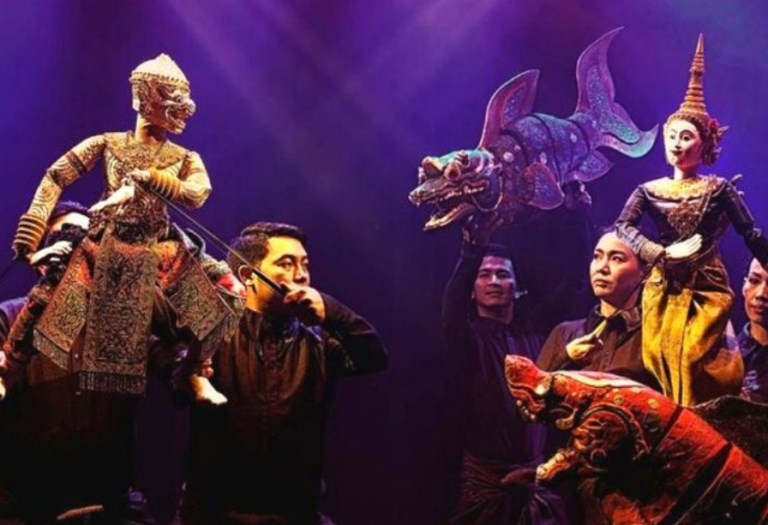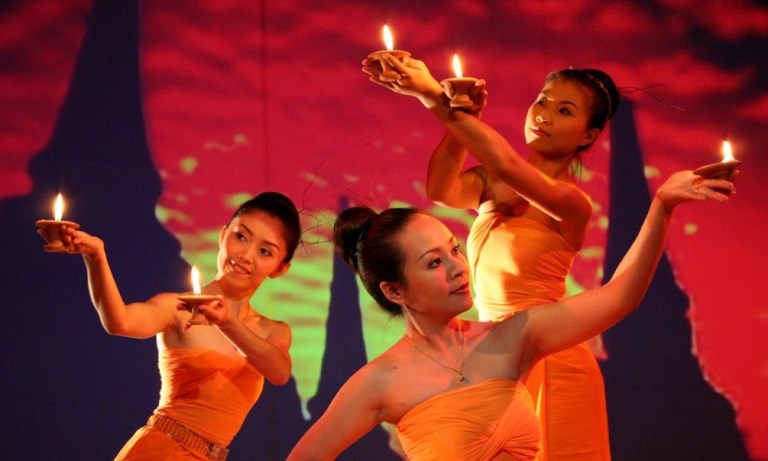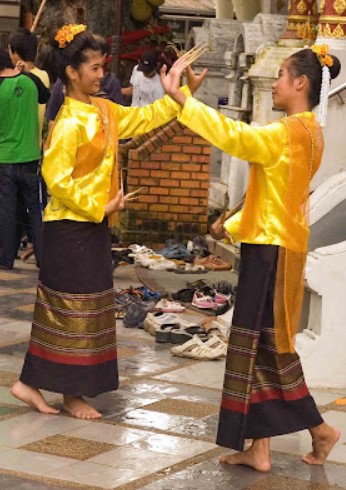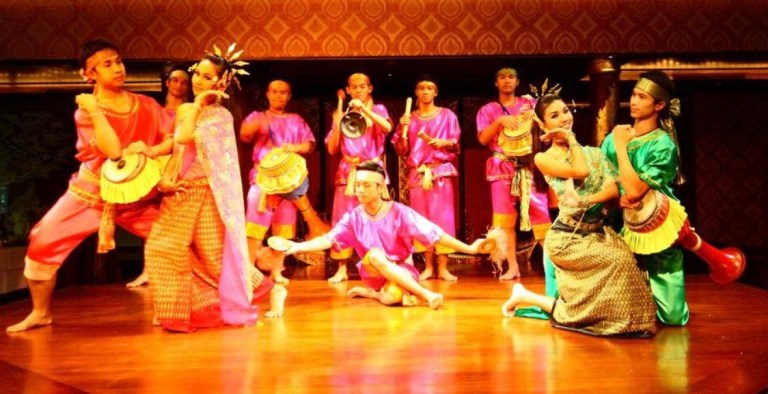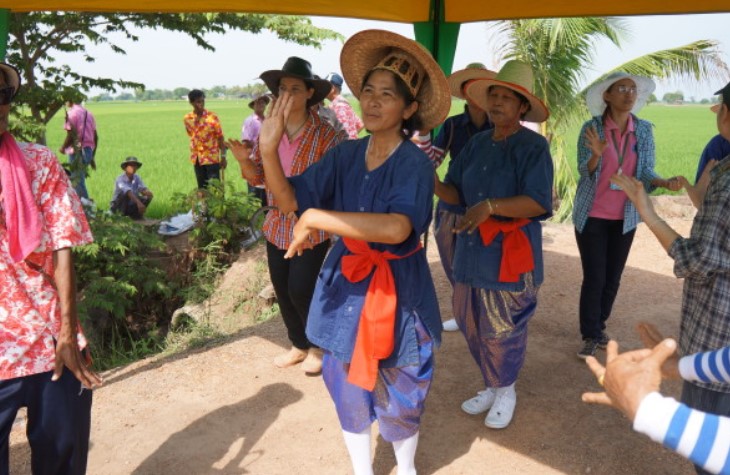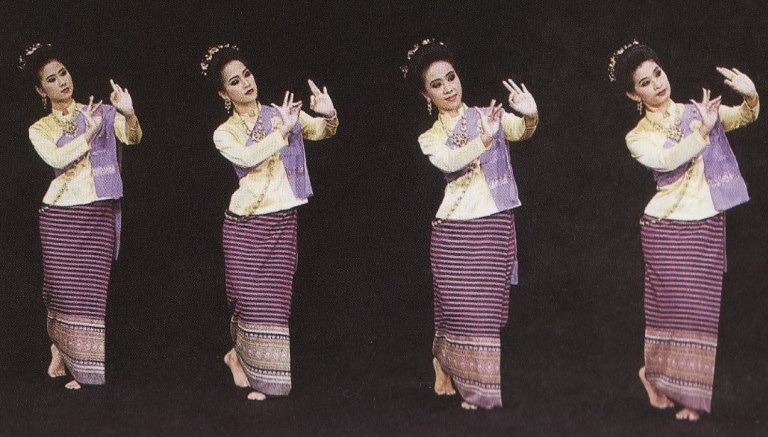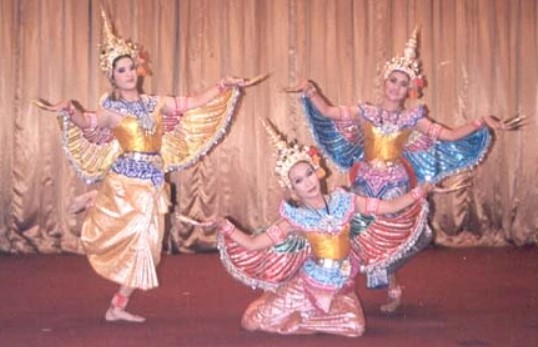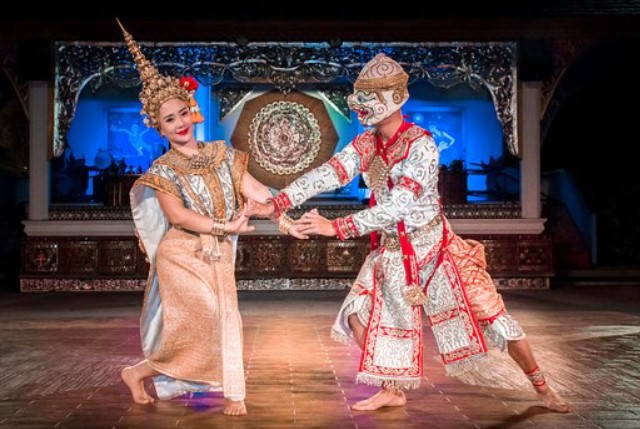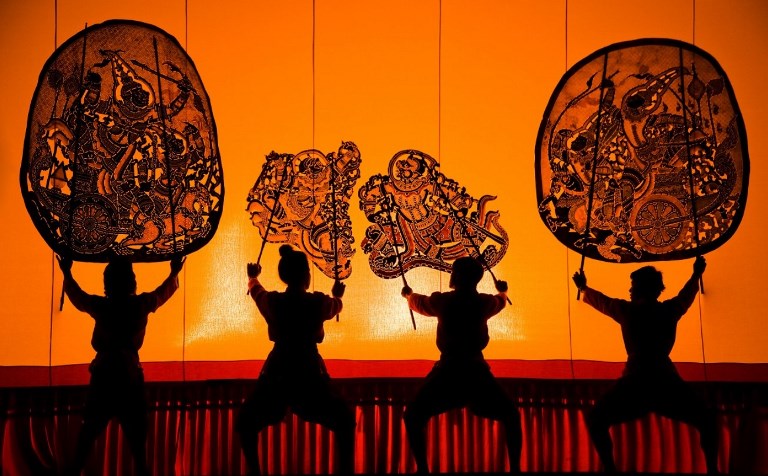The Land of Smiles – Thailand – is known for its friendly people and grand palaces.
But more than anything else, it’s known for its incredibly rich culture. Any visitor to Thailand is highly recommended to watch a performance of traditional Thai dance at least once.
But did you know that there are dozens of dances in the country?
If you don’t have a tour guide with you, you can count on this guide to give you a broad overview of all the classical Thai dances!
Table of Contents
- 3 Main Categories Of Classic Traditional Thai Dance
- Regional Folk Dances of Thailand
- Sri-Nuan
- Teut-Teung (Drum Dance)
- Farmers Dance (Rice Growers Dance)
- Serng Kratip Khoa
- Serng I-San
- Serng Krapo (Coconut Dance)
- Fon Sao Mai (Silk Weaving Dance)
- Sword Dance
- Likhe
- Bantheong (Happiness Dance)
- Nora
- Ram Nora Son Ram
- Ram Nora Klong Hong
- Ram Nora Tam Bot
- Ram wong
- Nora Tua Oon
- Nang Thalung (Shadow Puppetry)
- Final Words
3 Main Categories Of Classic Traditional Thai Dance
Khon
Khon is a Thai classical dance-drama that combines intricate movements, elaborate costumes, and storytelling. It is often performed during religious ceremonies and royal events.
The performers wear ornate masks and costumes depicting characters from the Ramakien, the Thai adaptation of the Indian epic Ramayana.
The dance movements in Khon are highly stylized and require years of training to master.
This traditional dance form showcases the rich cultural heritage of Thailand and has been passed down through generations.
Lakhon
Lakhon is a revered form of Thai classical dance that traces its origins back to the royal courts of ancient Thailand.
It is a graceful and highly stylized dance characterized by intricate hand gestures, elegant movements, and ornate costumes.
Lakhon Thai dance serves as a platform for expressing historical tales, myths, and spiritual beliefs, with performers skillfully conveying emotions and narratives through precise movements.
This traditional dance form is a living embodiment of Thailand’s rich cultural heritage. It preserves the beauty and grace of bygone eras while enchanting audiences with its timeless allure.
Lakhon Nai
Lakhon Nai is a refined and graceful dance form that originated in the royal courts of Thailand.
It is performed by female dancers who wear traditional attire, including a long-sleeved blouse, a long skirt, and a crown.
Lakhon Nai combines intricate hand gestures, delicate footwork, and expressive facial expressions to convey emotions and tell stories.
This dance form reflects the elegance and sophistication of the Thai court tradition.
Lakhon Nok
Lakhon Nok is a lively and comedic dance-drama featuring male and female performers. It is known for its humorous and exaggerated movements, as well as its vibrant costumes.
Lakhon Nok often incorporates slapstick comedy and satire. It entertains audiences with its playful and light-hearted style.
This dance form is commonly performed during festivals and celebrations to add joy and laughter to cultural events.
Lakhon Phatang
Lakhon Phatang is a form of dance-drama that originated in the southern region of Thailand. It combines dance, music, and theater elements to depict local folktales and legends.
The performers use their bodies and facial expressions to portray characters.
This dance form reflects Thailand’s cultural diversity and showcases the southern region’s unique traditions.
Lakhon Lek
Lakhon Lek is a traditional form of puppetry dance in Thailand. It involves using small puppets made of carved wood, cloth, or leather, controlled by puppeteers skilled in manipulating the puppets’ movements.
Lakhon Lek’s performances often depict episodes from the Ramakien or other mythical stories.
The puppeteers bring the puppets to life, enacting scenes with intricate choreography and synchronized movements.
Lakhon Lek showcases the artistry and craftsmanship of Thai puppetry. It delights audiences with its enchanting performances.
Fon (Faw Thai Dance)
Fon, also known as Faw Thai, is a traditional dance style that celebrates the vibrant culture of Thailand’s northern region.
It is a lively and energetic dance form characterized by quick footwork, rhythmic clapping, and dynamic movements.
Fon is often performed during festivals and joyful occasions, reflecting the vitality and zest for life that defines Thai culture.
This vibrant dance style not only showcases the physical prowess and agility of the dancers but also serves as a means of cultural expression, fostering a sense of community and collective celebration.
With its infectious energy and joyful spirit, Fon continues to captivate audiences, inviting them to immerse themselves in the festive atmosphere of Thailand’s cultural traditions.
Fawn Tian (Candle Dance)
Fon Fawn Tian (Candle Dance) is a mesmerizing dance performed with lit candles.
The dancers balance the candles on their heads and hands while gracefully moving their bodies.
This dance form is often completed during religious ceremonies.
Fawn Leb
Fon Fawn Leb is a traditional Thai dance showcasing hand movements’ beauty and grace. The dancers perform intricate finger movements accompanied by elegant body postures.
This dance form exemplifies the importance of hand gestures in Thai culture and storytelling.
Fawn Ngiew
Fon Fawn Ngiew is a dance form that originated in the northern region of Thailand. It features movements inspired by the graceful flight of birds, particularly the “ngiew” bird.
The dancers imitate the bird’s movements. They soar through the air with flowing motions.
Fon Fawn Ngiew combines fluid movements, agility, and a sense of freedom. It captures the essence of nature in its performance.
Fawn MactionsBer
Fon Fawn Marn Gumm Ber is a dance that symbolizes the harmony between humans and nature. It portrays the process of planting and harvesting, celebrating the agricultural traditions of Thailand.
The dancers mimic the actions of farmers: sowing seeds, tending to the crops, and reaping the harvest.
Fon Fawn Marn Gumm Ber expresses gratitude for the land’s bountiful gifts and the farmers’ hard work through rhythmic movements and coordinated gestures.
Fawn Marn Mong Kol
Fon Fawn Marn Mong Kol is a dance that pays homage to the ancient art of pottery-making. It represents the skill and craftsmanship involved in creating ceramic vessels.
The dancers imitate the actions of potters, shaping and molding clay, spinning pottery wheels, and firing the kiln.
Fon Fawn Marn Mong Kol showcases the intricate movements and precision required in pottery-making. The dance highlights this traditional craft’s cultural significance.
Regional Folk Dances of Thailand
Sri-Nuan
Sri-Nuan is a traditional Thai dance performed during religious and ceremonial events. It is characterized by slow, graceful movements accompanied by gentle music and chanting.
Sri-Nuan often features female dancers dressed in exquisite costumes and elaborate headdresses.
The dance conveys a sense of tranquility and spirituality. It invites the audience to experience a meditative and serene atmosphere.
Teut-Teung (Drum Dance)
Teut-Teung (Drum Dance) is a vibrant and energetic dance form showcasing traditional Thai drums’ rhythmic beats.
The dancers, usually in groups, move in sync with the pulsating music, creating a dynamic and lively performance.
Teut-Teung is often performed during festive and cultural celebrations. It captivates the audience with its energetic drumming and synchronized movements.
Farmers Dance (Rice Growers Dance)
Farmers Dance (Rice Growers Dance) is a dance form that pays homage to the central role of rice cultivation in Thai society. It depicts the daily lives of farmers, from preparing the fields to harvesting the rice.
The dancers mimic the actions of planting, reaping, and threshing the rice, accompanied by lively music and chants.
The Farmers Dance celebrates the agricultural heritage of Thailand. It serves as a reminder of the country’s strong connection to its agrarian roots.
Serng Kratip Khoa
Serng Kratip Khoa is a traditional Thai dance originating in the country’s central region. It is a highly expressive and dramatic form of dance-drama, often depicting stories of love, loyalty, and heroism.
Serng Kratip Khoa combines intricate choreography, elaborate costumes, and emotive facial expressions to convey deep emotions and narrative elements.
This dance form captivates the audience with its powerful storytelling and artistic performances.
Serng I-San
Serng I-San is a lively and energetic dance style originating from the northeastern region of Thailand known as Isan.
Fast-paced movements, rhythmic footwork, and vibrant music characterize it.
This dance form reflects the rich and lively spirit of the Isan region.
Serng Krapo (Coconut Dance)
Serng Krapo (Coconut Dance) is a unique dance form that originated in southern Thailand.
It showcases the agility and coordination of the dancers as they perform intricate movements while balancing coconut shells on their bodies.
Serng Krapo incorporates acrobatic stunts, such as flipping and jumping. This adds an element of excitement to the performance.
This dance form is a testament to the physical prowess and skill of the dancers.
Fon Sao Mai (Silk Weaving Dance)
Fon Sao Mai (Silk Weaving Dance) is a graceful and elegant dance that pays homage to the art of silk weaving. The dancers mimic the actions of silk weavers, delicately handling threads and creating intricate patterns.
This dance form showcases the precision and patience required for silk weaving.
The movements are fluid and gentle, reflecting the delicate nature of silk.
Fon Sao Mai celebrates Thailand’s rich textile traditions and artisans’ skills.
Sword Dance
Sword Dance is a dynamic and captivating dance form that incorporates swords as props. It combines martial arts and dance elements, showcasing the performers’ agility, strength, and skill.
The dancers execute precise and synchronized movements, wielding swords with finesse and control.
Sword Dance represents bravery, courage, and honor. It reflects the historical significance of martial arts in Thai culture.
Likhe
Likhe is a form of masked dance-drama that originated in the southern region of Thailand. It features performers wearing intricately carved masks depicting characters from mythology and folklore.
Likhe tells stories of battles between gods and demons, emphasizing the triumph of good over evil.
The masked dancers execute dramatic movements and engage in mock combat. They captivate the audience with their expressive gestures and vibrant costumes.
Bantheong (Happiness Dance)
Bantheong (Happiness Dance) is a joyful and celebratory dance that expresses happiness and good fortune. It is often performed during festivals and auspicious occasions.
Lively music, energetic movements, and vibrant costumes characterize Bantheong.
The dancers exude joy and enthusiasm, spreading a sense of merriment and positivity.
This dance form serves as a reminder of the importance of celebration and communal harmony in Thai culture.
Nora
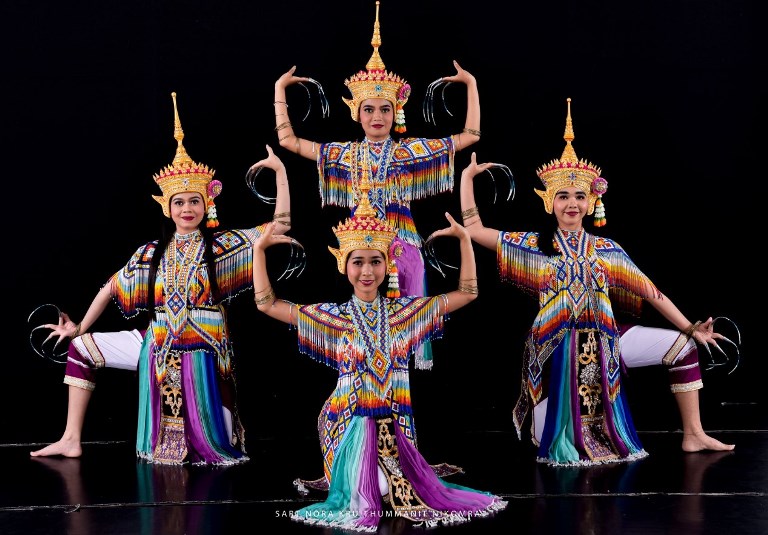
Nora is a traditional Thai dance-drama that combines graceful movements with storytelling. It is often performed in a group, featuring male and female dancers.
Nora encompasses many themes, including love, morality, and social issues.
The dancers use expressive gestures, intricate footwork, and fluid body movements to convey emotions and depict characters.
Nora showcases Thai dance’s versatility and artistic depth. The dance captivates audiences with its enchanting performances.
Ram Nora Son Ram
Ram Nora Son Ram is a dance-drama that originated in northern Thailand. It is based on the epic Ramakien and portrays the story of Rama, Sita, and the battle against the demon king Ravana.
Ram Nora Son Ram combines music, dance, and theater to depict the heroic deeds and triumph of good over evil.
The performers execute dynamic movements, acrobatics, and fight sequences. They create a visually spectacular and engaging performance.
Ram Nora Klong Hong
Ram Nora Klong Hong is a dance-drama representing the story of Prince Ram, his exile, and his encounters in the enchanted forest. It showcases the beauty of nature and the mystical elements of the woods.
The dancers move with grace and fluidity, embodying the characters and the enchanting atmosphere of the story.
Ram Nora Klong Hong brings to life the mythical world of Thai folklore. It enchants the audience with its ethereal performances.
Ram Nora Tam Bot
Ram Nora Tam Bot is a dance-drama that focuses on the episode of the construction of the monkey army’s bridge to Lanka.
It portrays the bravery and determination of Hanuman and the monkey warriors.
The dancers portray the characters with animated movements and vibrant costumes, capturing the energy and spirit of the story.
Ram Nora Tam Bot celebrates courage, loyalty, and the triumph of good over evil.
Ram wong
Ram Wong is a lively and interactive dance that encourages audience participation. It is commonly performed during social gatherings and festive occasions.
Ram Wong features simple yet energetic dance steps that people of all ages can easily learn and enjoy. The dancers form circles or lines, creating a sense of unity and camaraderie.
The participants move in sync, following the rhythmic beats of the accompanying music.
Ram Wong Thai dance brings people together, fostering a sense of community and celebration.
Nora Tua Oon
Nora Tua Oon is a traditional dance form that originated in the southern region of Thailand.
It is known for its graceful and delicate movements, which are reminiscent of the flight of birds.
Nora Tua Oon represents freedom, elegance, and beauty. The dancers emulate the lightness and agility of birds through their fluid motions and precise footwork.
This dance form captivates the audience with its ethereal and enchanting performances.
Nang Thalung (Shadow Puppetry)
Nang Thalung (Shadow Puppetry) is a unique and ancient form of Thai performing arts. It combines puppetry, storytelling, and music to bring traditional tales to life.
The puppeteers skillfully manipulate intricately designed leather puppets behind a backlit screen, creating mesmerizing shadow images.
Nang Thalung narrates mythological stories, historical events, and moral lessons. It captivates the audience with visual artistry and narratives.
Final Words
Steeped in history and customs, Thailand definitely befits its reputation as a land of traditions and ancient wonders.
That aspect of the country shines especially bright through these traditional dances. Each of which is an intricate display of music, movement, and storytelling art.
We hope this guide on the traditional dances of Thailand has been a helpful resource for you!
Which dances are your favorite? Do you have plans to see any of them on your upcoming trip to Thailand? Tell us in the comments!
